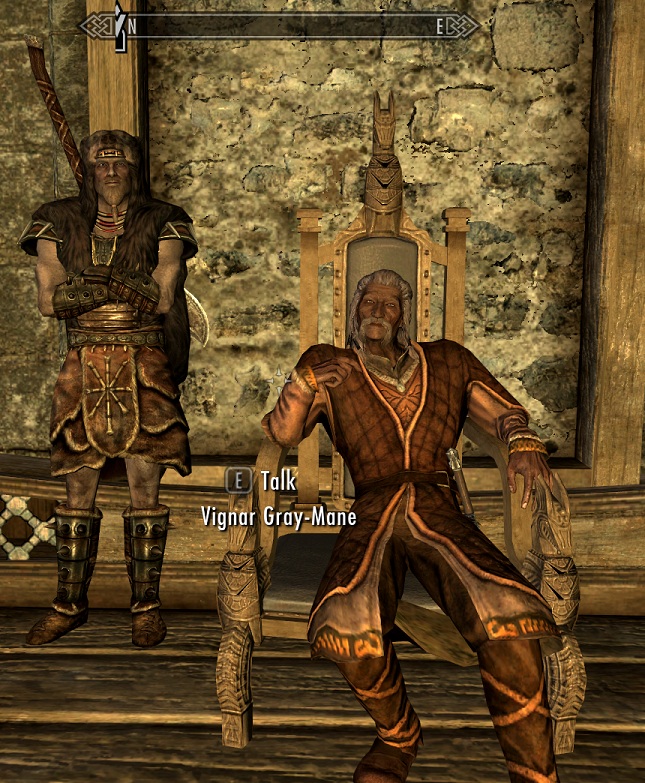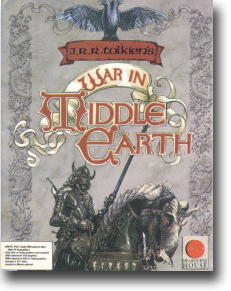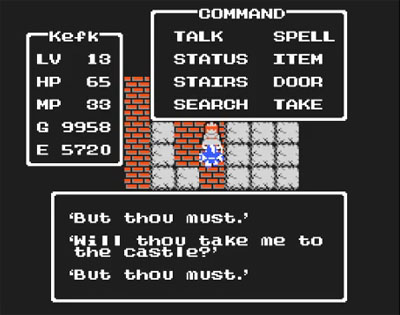Nickolaidas
Banned
When I was a young boy, my mother used to ask me stuff like: "Nick, what would you like to eat? Apples? Or pears?" and I would answer like, "Pears, ma!" and she would say, "I will make you both apples and pears", making me raise an eyebrow. A couple of years later, after one such exchange, I turned around and asked her, "Ma, why are you asking me what I want, even though in the end you will give me both? Is it so that you want me to feel like I have choice on the matter when I actually don't?" and my mother turned around, smiled and said, "Yes", and walked away. I never really thought about that ever again, until I played Final Fantasy VIII, many years ago, and went to that particular bit in the few first hours of the game. Where Squall, Seifer and Zell are sitting on a vehicle as it takes them on a mission. And Seifer tells Squall, "Hey Squall, go outside and take a look." To which the game offers you two choices to reply with:
A) .................... ok.
B) No.
If you pick A), Squall says just that and goes outside to check out what Seifer wants him to. If you pick B) ....
Squall: No.
Seifer: I'm your superior, so you must do as I say.
Squall: .............. ok.

As the years passed and the devs made more open world games and the Skyrim / Assassin's Creed / Mass Effect formula started to take off, more and more game devs became obsessed with marketing their game as this open-world RPG which has this amazing living world where 'your actions have consequences'. But do they?
The way I see it, the 'consequences' seem to come in three forms.
1) THE 'RESPONSE' CONSEQUENCE
This is definitely the laziest and most inconsequential consequence (heh) mechanic in RPGs. Basically, an NPC asks/comments on something, and your character has typically 2-3 replies, with all changing nothing in the narrative. You have the noble reply, the asshat reply and sometimes - if you are lucky - the downright 'no' reply. The noble reply is the reply that the game expects you to say if you want to roleplay your PC as a decent human being (which most people do) and a hero and progresses the game, the asshat reply is you making a sarcarstic reply about the NPC, the situation or the world in general, which may cause the NPC to make a short comment on that reply then immediately proceed with what they would say if you picked the noble response or (if the devs felt particularly lazy) not acknowledge the sarcasm at all and simply reply on the get go as if you picked the noble response) and the 'no' reply is you refusing to proceed to whatever narrative the game has in store for you and the game simply shrugs and says 'ok' via the NPC basically telling you something along the lines of "Very well. If you change your mind, I'll be here." or, in the case of jerk devs like Bioware, tell you to 'get over yourself', or 'this isn't about you' and then proceed with the quest as normal because the devs basically never intended you to have a choice there in the first place. To which I respond with, "then why ask me(, ma)?"
And that, reply number 3 that is, is the biggest deception of that particular choice mechanic. The game attempts to trick you into thinking you have a choice in accepting/rejecting an event/quest/conversation while it actually is just you delaying the inevitable. If you want to proceed the game or that quest, you HAVE to agree. You do not get to change the narrative - all you can do is set the time where it will start/continue. In the case of a side quest, 'no' means 'I'm not doing it (for now)' while in the main quest it means 'I'll do it later'. In the side quest, in particular, not doing the quest almost always never changes anything in the game world.

If you don't agree to help the villager find his missing sheep, nothing will change in the world. There are no consequences. The villager won't starve, his sheep won't die, someone else won't appear to do what you refused to do, etc. Nothing changes. The villager will stand on that particular spot (or patrol the same route) for all eternity until you agree to find his sheep. That is not a living, breathing world. That is a quest mechanic from the late 90s which refused to evolve in any way whatsoever.
2) THE 'PERSONAL' CONSEQUENCE
This is the consequence mechanic where your actions have some direct consequence to you, and you only. It can be short and direct, or long term. While this is definitely a step in the right direction, it's still not proof of a living, breathing world. For example, killing the blacksmith in a Souls game has immediate and direct consequences to you, as that means you can no longer repair or upgrade your equipment. However, it changes nothing in the world, and aside from the blacksmith being dead, no one acknowledges this turn of events. Nothing changes besides you cucking yourself out of some better weaponry.
Did you attempt to steal something and you were caught? You are pursued by the Law, but if you go to jail and pay your dues, the person you stole from has literally no problems interacting with you and acts as if nothing happened. Personally, if someone robbed my house and got out of jail a few weeks/months later, I wouldn't speak to him as if nothing ever happened.
Another example is you stealing stuff from a house in Skyrim, only to have a few thugs assault you at a later time, and when you search their corpses, you find a note which is from the NPC you stole from, instructing them to punish you, but not kill you (even though they actually tried to, but that's besides the point). If you go to that NPC, their attitude (and yours) doesn't change. It doesn't affect your relationship with them at all. The game reacted with a random encounter and a note randomly signed by one of the NPCs you stole from, and that was it.
3) THE 'WORLD CHANGING' CONSEQUENCE
This is a little more complex and the hardest to implement correctly. If done badly, it can truly open your eyes to the bullshit the devs are spouting, as it happened to me.
This is the consequence mechanic where your actions are supposed to have consequences which shift the game world directly or indirectly. The majority of open-world RPGs best attempt of doing this is the good/bad ending, but almost always it is horribly implemented. For example, in Fable, you get to do good actions to make your character go towards the Light side, and bad actions which turn your character over to the Dark side. The only problem is that in the end the game gives you a choice. A or B. A will give you the good ending while B will give you the bad ending. Which means that you can play your character as a complete asshole and in the end pick A, giving you the good ending, and vice versa. So all your choices, all your quests, all your decisions do not. Matter. At ALL. The only thing that matters, the only thing that decides the ending of the game is the last four seconds of gameplay. And that's

Some devs who want to make a decent effort will present you with a few quests where you have to 'pick a side' in some kind of dispute, and your choice will basically decide which side will be on top once the dust settles or the quest ends. The Civil War in Skyrim is one of the best examples, as also the more recent and infamous Druid Grove Defend, Raid or Ignore quest in Baldur's Gate III. And while on the surface this is a good attempt at first, in the long run (or once you stop and think about it), it doesn't change a whole lot.
I mean, SURE, in Skyrim's case you get to decide who is in power of the province, you kill a few NPCs and witness some NPCs of the other side rise to power, but in the end, nothing substantial changes. There is a different NPC sitting on the throne of Whiterun if you sided with Ulfric, but that's about it. NPCs of the opposing (now defeated) faction will claim that they are angry with you in their opening statement, but they will still sell you their wares without question and will answer any question you might have. The same towns that existed before the war exist after the war. The same factions that existed before the war exist after the war (except the one directly involved in the civil war and lost). Each town which was devoted to the faction that lost swaps leaders and personal bodyguards, but that's about it. Nothing really substantial happens. Your main quest doesn't change. Your following quests don't change. All it changes is who rubs his chin as they greet you when you approach their throne room.

In Baldur's Gate III's case, raiding the grove results in you swapping sides in the final battle of that 'event', and you celebrate with different people in the festivities afterwards, but it's clear as the game goes on that choosing to be a bad guy in that event was an afterthought for the devs, not a feature. Helping the Grove will allow you to keep multiple companions in your party and a lot of NPCs to interact with in a later part of the game. Raiding the Grove basically makes 2-4 party members leave your group or outright attack you, removes numerous NPCs to interact with later on, and the only shining beacon in that choice is getting a badass Drow bitch in your group (and after the patches, even she can join you later on if you choose to oppose her and defend the Grove). So while there is a 'world changing' consequence in raiding the grove, it mostly feels like a bigger scale of killing the Blacksmith in Dark Souls.
To be fair, I need to point out that Larian did a GREAT effort in creating as many little changes as they could in these choices and quests and are FAR better than almost anything other devs have produced. For example, if you take too long to go to the edge of the Tiefling camp where a boy is being charmed by harpies, you will instead find its half-eaten corpse instead of him walking towards them entranced. So yes, BG3 made a good effort, and I acknowledge that.

Another thing I would like to point out in consequence bullshit which was marketed in Mass Effect, about the point of claiming that your actions will have consequences even in the sequels. To that I will say, bull-fucking-shit. The changes are so superficial (most of them anyway) that it makes little to no difference. For example, choosing to spare Wrex or kill him sounds huge since he's a main party member right? Well no, because since you have the option to kill him, Bioware didn't think it was worth the trouble to create a slew of content for him in Mass Effect 2 since he might be dead in someone's playthrough so he's no longer a party member in ME2 but rather, an NPC who is basically a quest giver, and if you killed him? He's simply replaced with his brother for the quest giver role. Or if you choose to save the council in the final battle in ME1, it changes nothing because either way, the alien races, in a testament of pure retardation, decide to give humanity full governmental control in ME2 (and the former council simply makes an appearance in a cutscene). Which is fucking stupid, imo. It's like the United Nations giving Greece full authority and everyone stepping down because the Greeks killed a upcoming dictator or something. At any rate, the fact remains that the devs simply didn't have the time or the resources to put effort in those consequences, so said consequences are shallow and insignificant because the devs had to take into account every single character who died in the previous game due to your actions. If you, as a dev, have a character who can die in Mass Effect 1 become a minor non-playable character in terms of screentime in the sequel, how much does that exactly change the narrative if I spared/saved them, since they become so inconsequential they might as well be dead in the sequel even though I saved them? What's the point? You 'retire' the character in the sequel, no matter what I do. So what's the fucking point?

For me, a 'consequence' needs to be something more than just 'choose how to say ok' or 'NPC is alive if you do X, is dead/'on a bus' if you do Y'. In order to give the player a true sense of agency, in order for their choices to matter, the choice needs to have a multitude of consequences of numerous degrees, not just one or two.
For example, to go back to the thugs who are hired by the NPC you stole from, imagine beating/killing them and you find/get the note of the NPC, giving them instructions. Why not have the option to go to the NPC and CONFRONT them about it? Have them lose their shit and shit bricks because you now have a contract signed by them, in hand, which means you can report them to the authorities? And now you can blackmail them for more money or items? or ignore the NPC, go to the town's authorities, and witness the guards arresting that NPC? And you can now go to the dungeons, find that person and mock them or try to make peace with them? And all that because you stole all their sweet rolls in their kitchen?
How about, in the civil war questline, the strongest supporters of the side which lost, follow you and boo/harass you every time you enter their city? Or the more hot-tempered ones attempting to punch you to the ground? Traders refusing to sell you their wares because they now hate your guts? Jarls hiring city criers to begin spouting propaganda to make the people realize that things have changed now that they are in charge (and through them, you as well)?
How about you get Sazza and Ragzlin in your party as well as Minthara if you raid the Grove, to better drive the point on what your party (and you) are slowly becoming?
But in the end, all these are small changes. And I understand that action & consequence is a HUGE endeavour. The devs cannot cherry pick every single thing, BUT - they shouldn't CLAIM they do as well. Stop selling me this fairytale that 'every action matters'. They don't. Factually, realistically, the majority of my actions do not matter. Stop asking me if I want apples or pears when your goal is to do what you wanted to in the first place. You're not my ma.
The ONLY way the action and consequence mechanic can successfully work, imo, is with a game engine whose characters are influenced by an A.I. character model, which talks, learns and adapts to your speech, actions, equipment and attitude, accordingly, WITHOUT waiting for a dev to have an epiphany and guess every fucking thing a player intends to do. An A.I. that has the intellect to understand what it means if my character is running towards them with a two handed sword, and act accordingly, and that DO NOT forget what happened five seconds later and talk to me like I got out of my house with my tuxedo on. A virtual dungeon master which sees how you play, what you like to do, and creates/reacts accordingly. A game world that is so reactionary that you can literally start a fire in a village and watch the villagers panicking and trying to douse the flames, and if, via your actions, they fail, they need to run away, and abandon their homes. And a few days later, they come back and try to rebuild.
And if you can't with the current hardware - and that's perfectly fine - do not tell me that you have a vast, living world when you basically have thirty NPCs who walk around in a pre-ordained schedule and only respond to direct attack on their person or someone nearby. NPCs who are so brain-dead they let me put a bucket over their heads, or watch me run around in circles around them and act as if I don't. Until you can fix all that, just claim you have a vast continent to explore or something. Don't talk to me about meaningful choices of a 'vast, living, breathing world'.

Cause that's not how choice and consequence works.
A) .................... ok.
B) No.
If you pick A), Squall says just that and goes outside to check out what Seifer wants him to. If you pick B) ....
Squall: No.
Seifer: I'm your superior, so you must do as I say.
Squall: .............. ok.

As the years passed and the devs made more open world games and the Skyrim / Assassin's Creed / Mass Effect formula started to take off, more and more game devs became obsessed with marketing their game as this open-world RPG which has this amazing living world where 'your actions have consequences'. But do they?
The way I see it, the 'consequences' seem to come in three forms.
1) THE 'RESPONSE' CONSEQUENCE
This is definitely the laziest and most inconsequential consequence (heh) mechanic in RPGs. Basically, an NPC asks/comments on something, and your character has typically 2-3 replies, with all changing nothing in the narrative. You have the noble reply, the asshat reply and sometimes - if you are lucky - the downright 'no' reply. The noble reply is the reply that the game expects you to say if you want to roleplay your PC as a decent human being (which most people do) and a hero and progresses the game, the asshat reply is you making a sarcarstic reply about the NPC, the situation or the world in general, which may cause the NPC to make a short comment on that reply then immediately proceed with what they would say if you picked the noble response or (if the devs felt particularly lazy) not acknowledge the sarcasm at all and simply reply on the get go as if you picked the noble response) and the 'no' reply is you refusing to proceed to whatever narrative the game has in store for you and the game simply shrugs and says 'ok' via the NPC basically telling you something along the lines of "Very well. If you change your mind, I'll be here." or, in the case of jerk devs like Bioware, tell you to 'get over yourself', or 'this isn't about you' and then proceed with the quest as normal because the devs basically never intended you to have a choice there in the first place. To which I respond with, "then why ask me(, ma)?"
And that, reply number 3 that is, is the biggest deception of that particular choice mechanic. The game attempts to trick you into thinking you have a choice in accepting/rejecting an event/quest/conversation while it actually is just you delaying the inevitable. If you want to proceed the game or that quest, you HAVE to agree. You do not get to change the narrative - all you can do is set the time where it will start/continue. In the case of a side quest, 'no' means 'I'm not doing it (for now)' while in the main quest it means 'I'll do it later'. In the side quest, in particular, not doing the quest almost always never changes anything in the game world.

If you don't agree to help the villager find his missing sheep, nothing will change in the world. There are no consequences. The villager won't starve, his sheep won't die, someone else won't appear to do what you refused to do, etc. Nothing changes. The villager will stand on that particular spot (or patrol the same route) for all eternity until you agree to find his sheep. That is not a living, breathing world. That is a quest mechanic from the late 90s which refused to evolve in any way whatsoever.
2) THE 'PERSONAL' CONSEQUENCE
This is the consequence mechanic where your actions have some direct consequence to you, and you only. It can be short and direct, or long term. While this is definitely a step in the right direction, it's still not proof of a living, breathing world. For example, killing the blacksmith in a Souls game has immediate and direct consequences to you, as that means you can no longer repair or upgrade your equipment. However, it changes nothing in the world, and aside from the blacksmith being dead, no one acknowledges this turn of events. Nothing changes besides you cucking yourself out of some better weaponry.
Did you attempt to steal something and you were caught? You are pursued by the Law, but if you go to jail and pay your dues, the person you stole from has literally no problems interacting with you and acts as if nothing happened. Personally, if someone robbed my house and got out of jail a few weeks/months later, I wouldn't speak to him as if nothing ever happened.
Another example is you stealing stuff from a house in Skyrim, only to have a few thugs assault you at a later time, and when you search their corpses, you find a note which is from the NPC you stole from, instructing them to punish you, but not kill you (even though they actually tried to, but that's besides the point). If you go to that NPC, their attitude (and yours) doesn't change. It doesn't affect your relationship with them at all. The game reacted with a random encounter and a note randomly signed by one of the NPCs you stole from, and that was it.
3) THE 'WORLD CHANGING' CONSEQUENCE
This is a little more complex and the hardest to implement correctly. If done badly, it can truly open your eyes to the bullshit the devs are spouting, as it happened to me.
This is the consequence mechanic where your actions are supposed to have consequences which shift the game world directly or indirectly. The majority of open-world RPGs best attempt of doing this is the good/bad ending, but almost always it is horribly implemented. For example, in Fable, you get to do good actions to make your character go towards the Light side, and bad actions which turn your character over to the Dark side. The only problem is that in the end the game gives you a choice. A or B. A will give you the good ending while B will give you the bad ending. Which means that you can play your character as a complete asshole and in the end pick A, giving you the good ending, and vice versa. So all your choices, all your quests, all your decisions do not. Matter. At ALL. The only thing that matters, the only thing that decides the ending of the game is the last four seconds of gameplay. And that's

Some devs who want to make a decent effort will present you with a few quests where you have to 'pick a side' in some kind of dispute, and your choice will basically decide which side will be on top once the dust settles or the quest ends. The Civil War in Skyrim is one of the best examples, as also the more recent and infamous Druid Grove Defend, Raid or Ignore quest in Baldur's Gate III. And while on the surface this is a good attempt at first, in the long run (or once you stop and think about it), it doesn't change a whole lot.
I mean, SURE, in Skyrim's case you get to decide who is in power of the province, you kill a few NPCs and witness some NPCs of the other side rise to power, but in the end, nothing substantial changes. There is a different NPC sitting on the throne of Whiterun if you sided with Ulfric, but that's about it. NPCs of the opposing (now defeated) faction will claim that they are angry with you in their opening statement, but they will still sell you their wares without question and will answer any question you might have. The same towns that existed before the war exist after the war. The same factions that existed before the war exist after the war (except the one directly involved in the civil war and lost). Each town which was devoted to the faction that lost swaps leaders and personal bodyguards, but that's about it. Nothing really substantial happens. Your main quest doesn't change. Your following quests don't change. All it changes is who rubs his chin as they greet you when you approach their throne room.

In Baldur's Gate III's case, raiding the grove results in you swapping sides in the final battle of that 'event', and you celebrate with different people in the festivities afterwards, but it's clear as the game goes on that choosing to be a bad guy in that event was an afterthought for the devs, not a feature. Helping the Grove will allow you to keep multiple companions in your party and a lot of NPCs to interact with in a later part of the game. Raiding the Grove basically makes 2-4 party members leave your group or outright attack you, removes numerous NPCs to interact with later on, and the only shining beacon in that choice is getting a badass Drow bitch in your group (and after the patches, even she can join you later on if you choose to oppose her and defend the Grove). So while there is a 'world changing' consequence in raiding the grove, it mostly feels like a bigger scale of killing the Blacksmith in Dark Souls.
To be fair, I need to point out that Larian did a GREAT effort in creating as many little changes as they could in these choices and quests and are FAR better than almost anything other devs have produced. For example, if you take too long to go to the edge of the Tiefling camp where a boy is being charmed by harpies, you will instead find its half-eaten corpse instead of him walking towards them entranced. So yes, BG3 made a good effort, and I acknowledge that.

Another thing I would like to point out in consequence bullshit which was marketed in Mass Effect, about the point of claiming that your actions will have consequences even in the sequels. To that I will say, bull-fucking-shit. The changes are so superficial (most of them anyway) that it makes little to no difference. For example, choosing to spare Wrex or kill him sounds huge since he's a main party member right? Well no, because since you have the option to kill him, Bioware didn't think it was worth the trouble to create a slew of content for him in Mass Effect 2 since he might be dead in someone's playthrough so he's no longer a party member in ME2 but rather, an NPC who is basically a quest giver, and if you killed him? He's simply replaced with his brother for the quest giver role. Or if you choose to save the council in the final battle in ME1, it changes nothing because either way, the alien races, in a testament of pure retardation, decide to give humanity full governmental control in ME2 (and the former council simply makes an appearance in a cutscene). Which is fucking stupid, imo. It's like the United Nations giving Greece full authority and everyone stepping down because the Greeks killed a upcoming dictator or something. At any rate, the fact remains that the devs simply didn't have the time or the resources to put effort in those consequences, so said consequences are shallow and insignificant because the devs had to take into account every single character who died in the previous game due to your actions. If you, as a dev, have a character who can die in Mass Effect 1 become a minor non-playable character in terms of screentime in the sequel, how much does that exactly change the narrative if I spared/saved them, since they become so inconsequential they might as well be dead in the sequel even though I saved them? What's the point? You 'retire' the character in the sequel, no matter what I do. So what's the fucking point?

For me, a 'consequence' needs to be something more than just 'choose how to say ok' or 'NPC is alive if you do X, is dead/'on a bus' if you do Y'. In order to give the player a true sense of agency, in order for their choices to matter, the choice needs to have a multitude of consequences of numerous degrees, not just one or two.
For example, to go back to the thugs who are hired by the NPC you stole from, imagine beating/killing them and you find/get the note of the NPC, giving them instructions. Why not have the option to go to the NPC and CONFRONT them about it? Have them lose their shit and shit bricks because you now have a contract signed by them, in hand, which means you can report them to the authorities? And now you can blackmail them for more money or items? or ignore the NPC, go to the town's authorities, and witness the guards arresting that NPC? And you can now go to the dungeons, find that person and mock them or try to make peace with them? And all that because you stole all their sweet rolls in their kitchen?
How about, in the civil war questline, the strongest supporters of the side which lost, follow you and boo/harass you every time you enter their city? Or the more hot-tempered ones attempting to punch you to the ground? Traders refusing to sell you their wares because they now hate your guts? Jarls hiring city criers to begin spouting propaganda to make the people realize that things have changed now that they are in charge (and through them, you as well)?
How about you get Sazza and Ragzlin in your party as well as Minthara if you raid the Grove, to better drive the point on what your party (and you) are slowly becoming?
But in the end, all these are small changes. And I understand that action & consequence is a HUGE endeavour. The devs cannot cherry pick every single thing, BUT - they shouldn't CLAIM they do as well. Stop selling me this fairytale that 'every action matters'. They don't. Factually, realistically, the majority of my actions do not matter. Stop asking me if I want apples or pears when your goal is to do what you wanted to in the first place. You're not my ma.
The ONLY way the action and consequence mechanic can successfully work, imo, is with a game engine whose characters are influenced by an A.I. character model, which talks, learns and adapts to your speech, actions, equipment and attitude, accordingly, WITHOUT waiting for a dev to have an epiphany and guess every fucking thing a player intends to do. An A.I. that has the intellect to understand what it means if my character is running towards them with a two handed sword, and act accordingly, and that DO NOT forget what happened five seconds later and talk to me like I got out of my house with my tuxedo on. A virtual dungeon master which sees how you play, what you like to do, and creates/reacts accordingly. A game world that is so reactionary that you can literally start a fire in a village and watch the villagers panicking and trying to douse the flames, and if, via your actions, they fail, they need to run away, and abandon their homes. And a few days later, they come back and try to rebuild.
And if you can't with the current hardware - and that's perfectly fine - do not tell me that you have a vast, living world when you basically have thirty NPCs who walk around in a pre-ordained schedule and only respond to direct attack on their person or someone nearby. NPCs who are so brain-dead they let me put a bucket over their heads, or watch me run around in circles around them and act as if I don't. Until you can fix all that, just claim you have a vast continent to explore or something. Don't talk to me about meaningful choices of a 'vast, living, breathing world'.

Cause that's not how choice and consequence works.
Last edited:













